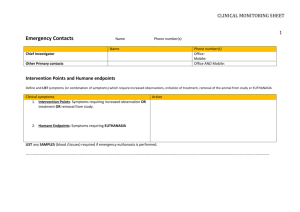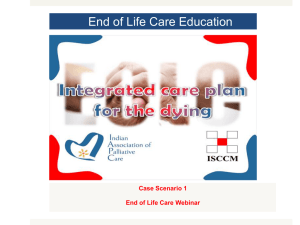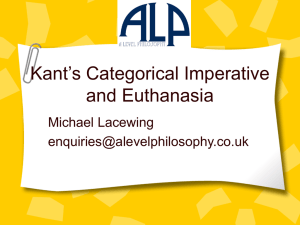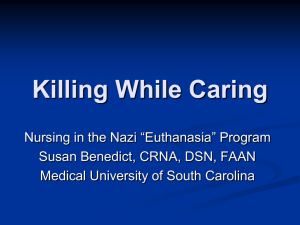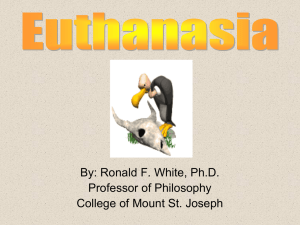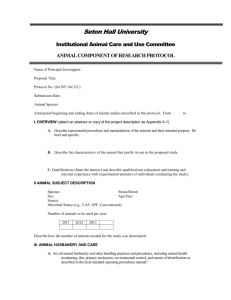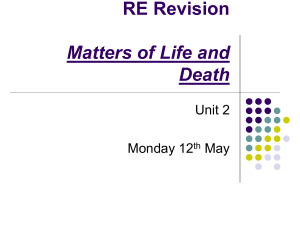File
advertisement
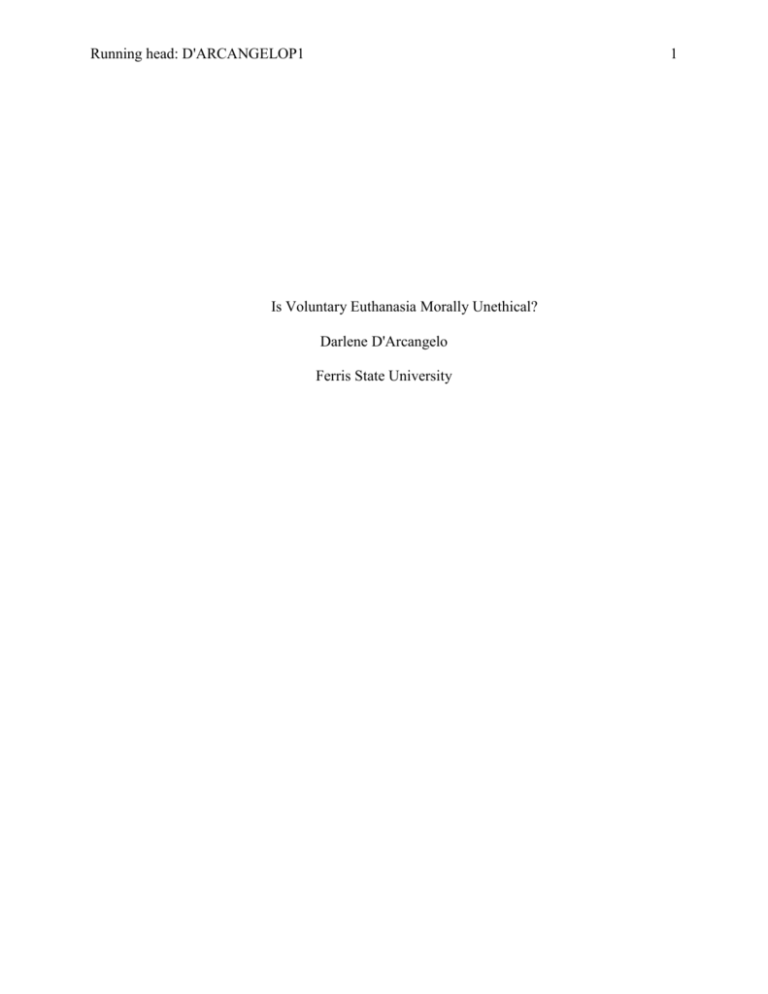
Running head: D'ARCANGELOP1 1 Is Voluntary Euthanasia Morally Unethical? Darlene D'Arcangelo Ferris State University D'ARCANGELOP1 2 Abstract Is it ethical to assist in voluntary euthanasia? This topic has been hotly debated throughout the medical community as of late. When death is inevitable, the issue of choosing to end one’s life rather than to live in agony any longer has become an issue of morality among people. By examining the representations and the restrictions against any means of inducing death, posed by the Hippocratic Oath. The ethics of voluntary euthanasia is analyzed along with the obligation and moral ambiguity involved with ending a person’s suffering and allowing the choice for voluntary euthanasia . D'ARCANGELOP1 3 Is it Immoral to Assist in Voluntary Euthanasia? Day after day you watch your loved one’s health decline, each day the struggle to breath increases, the pain is excruciating, the look in their eyes is beyond heart wrenching. With every passing hour your helplessness grows as you witness this unbearable agony. The physicians cannot tell you how long this will continue, they can only offer your loved one medication to ease the symptoms. After struggling too long your loved one begs the physician to please help them end their struggling. The physician informs you both that it is medically unethical and immoral to assist with this request, even though he knows that death is imminent. The struggle to live is unbearable to watch, death is imminent, is it unethical to assist in voluntary euthanasia? Euthanasia has sparked many discussions; laws have been passed making this act illegal in many countries. The movie Million Dollar Baby explores euthanasia from the position of the medical profession and the ethical contract to which the profession is bound. Although the original Hippocratic Oath “is rarely read or recited” (Herrel, 2000), the principles Oath is ingrained in the medical profession "The Oath of Hippocrates," holds the American Medical Association's Code of Medical Ethics (1996 edition), "has remained in Western civilization as an expression of ideal conduct for the physician." (Tyson, 2001) “To please no one will I prescribe a deadly drug or give advice that may induce death” (Herrel, 2000) In viewing Million Dollar Baby, you are introduced to Maggie the heroine of the movie who suffers a life altering injury. Because of her injury Maggie becomes a quadriplegic, dependent on a ventilator to maintain life. As the movie progresses you witness the progression of the comorbidities that can be associated with being in this physical state. Not only do you D'ARCANGELOP1 4 watch the physical complications unfold, but you also witness the defeat of the human spirit in the character of Maggie, this defeat of the human spirit is the most troubling. In viewing this movie from a medically ethic standpoint, euthanasia would not be an option for Maggie. As stated from the first documents of Hippocratic Oath supporting a means to induce death is not permissible. Medicine and the advances made in this field are to benefit mankind by preserving life, not terminating it. If allowing voluntary euthanasia physicians may be forced into situations that contradict their personal and medical ethics, by coercing physicians to assist anyone who wants to end their life regardless of the reason. It can be argued that if there were no restrictions placed on voluntary assisted suicide this act could become a gateway for anyone who wanted to end their life. If one were to view Kant’s reasoning as a “categorical imperative” (Edge & Groves, 2007) “there would be no exceptions, there would be universal application, unconditionally, and demanding action” (Edge & Groves, 2007). Thus allowing the act of voluntary euthanasia no matter what the reason. This viewpoint could be argued based on restrictions and guidelines that would need to be in place before allowing the action. As a country, as a state, as a city, we all have laws and guidelines that we must adhere to in order to live in society. I cannot fathom the idea of this situation not having the same requirements or even stricter requirements. From the standards of justice where persons are free and equal, each person should have the right to choose if voluntary euthanasia was legally allowed. In the movie Maggie does try to end her own life by biting off her tongue, she fails at her attempt; her life is then saved by surgery. Can it be argued that we have a moral obligation to save those who clearly want to end their lives? Does a virtuous physician have to make every D'ARCANGELOP1 5 attempt to save the life of a suicide patient if presented with one? If the physician so chooses to aid the individual, is he doing so from virtue or from duty? It can be said that a physician’s duty is to save lives, even if the individual does not want to be saved. As a virtuous person the physician may choose to save the life of the individual because they believe that saving a person’s life is the ultimate act of kindness. In saving the life of Maggie whose wish is to die, is it really an act of kindness by saving her? Wouldn’t allowing Maggie to die, just as she had wished, be virtuous? How can someone else’s beliefs or sense of virtue be cast upon another? To truly be virtuous is to allow an individual the freedom to make their choice to end their life. The overall concept of Utilitarianism is doing the right thing to make the most the happiest. It could be argued that Utilitarianism is viewed as a morally right action. However, Utilitarianism is also perceived as each individual has the autonomy to make decisions in regard to their own being. If one were to choose death to eliminate pain and suffering than that would be their freedom of choice and autonomy. The Utilitarian’s view on Maggie’s choice for voluntary euthanasia would be that of acceptance based on her autonomy in regard for herself. Voluntary euthanasia is a choice that is dependent on an individual’s need and respect for their autonomous choices. As we live we will one day also die, in life we all choose our own journey and live our lives’ based on our principles. In a scene from Million Dollar Baby, Frankie does not agree with voluntary euthanasia based on his principles. However, Frankie finally agrees to aid Maggie in choosing death over life. If faced with an incurable illness that renders the life out of the body and the quality of life is nil, we should be allowed to choose whether we want to live or die. Voluntary Euthanasia should be a choice based on an individual’s own needs and morals. D'ARCANGELOP1 6 References Edge, R. S., & Groves, J. R. (2007). Ethics of Health Care: A Guide for Clinical Practice (3rd ed.). Clifton Park, NY: Thomson Delmar Learning. Herrel, H. (2000). The Hippocratic Oath: A commentary and translation. Retrieved February 27, 2012, from http://www.utilis.net/hippo.htm Tyson, P. (2001, March 27). The Hippocratic Oath Today. Retrieved February 26, 2012, from http://www.pbs.org/wgbh/nova/doctors/oath_doctors.html D'ARCANGELOP1 7
